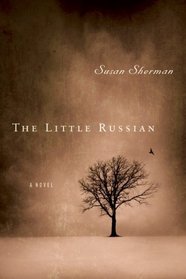An interesting book about a Jewish woman who lived in Russia in early 20ths century. Gerta marries a talented man who loves her dearly but refuses to leave the country when he finds himself pursued by local authorities. Jewish people work hard to live their lives and pursue their faith but even they are divided. It's a time of conflict among the different groups who live in Little Russia and, later, at war with Germany. WWI is difficult for the country and its people. In the cities there are food shortages and people lose their jobs and homes. Gerta is one who is trapped by the chaos with her two children unable to follow her husband to America. It's an entertaining read and I enjoyed it.
I knew going into this book that things weren't going to go well for the main character; she was a Jewish girl in Russia in WWI. That's why I wanted to read this, though - that's a part of history that I don't know that much about. Everyone knows about the treatment of Jews in and around Europe in WWII but what was going on in Russia 30-40 years earlier? This novel will certainly drive that revelation home.
I liked Berta from the beginning, very concerned with rising above her birth circumstances to become the person she believed she was meant to be. The girl had ambition and didn't like to be judged based on how she was born.
As the novel progressed, I saw the same Berta severely humbled into relying on everything that made her a self-made woman (minus the money). She never compromised her principles and did manage to keep her head up despite some pretty grave situations.
By the end, I came to realize something about Berta that she seemed to realize at the same time about herself: she can't deny from where (and from whom) she came; who she is, is a little cairn of people and events and attributes - she arranges those beneath her but she may not remove any of them.
Exhausting read but worth it. As historical fiction goes, this one is sweeping.
I liked Berta from the beginning, very concerned with rising above her birth circumstances to become the person she believed she was meant to be. The girl had ambition and didn't like to be judged based on how she was born.
As the novel progressed, I saw the same Berta severely humbled into relying on everything that made her a self-made woman (minus the money). She never compromised her principles and did manage to keep her head up despite some pretty grave situations.
By the end, I came to realize something about Berta that she seemed to realize at the same time about herself: she can't deny from where (and from whom) she came; who she is, is a little cairn of people and events and attributes - she arranges those beneath her but she may not remove any of them.
Exhausting read but worth it. As historical fiction goes, this one is sweeping.




